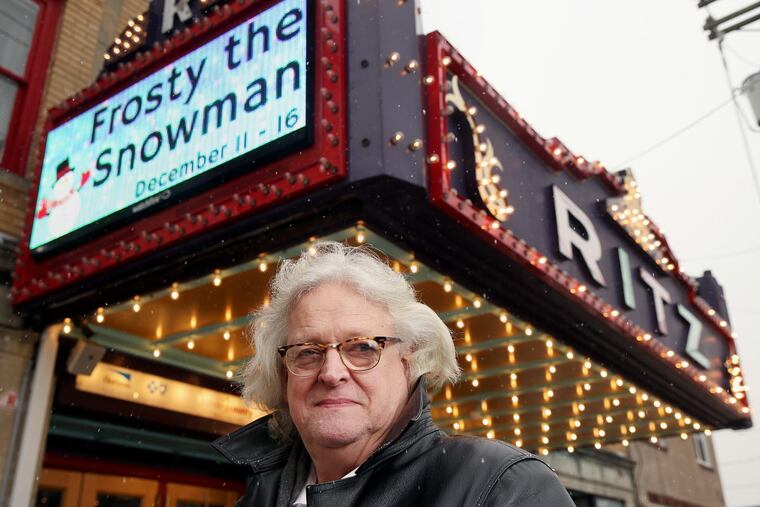At South Jersey's Ritz, a marquee effort to attract new audiences
In South Jersey and elsewhere, traditional performing arts venues such as the Ritz, on the White Horse Pike in Haddon Township, are finding it a challenge to connect with younger audiences.

Bruce Curless was in third grade when he produced, directed, and starred in his first play.
His debut, titled Jack and the Beanstalk Grows Again, drew raves from his Indiana elementary school classmates.
But Curless' greatest-ever production has been to transform a faded, X-rated White Horse Pike movie house into a legitimate theater, beginning in 1985.
Four years ago, he led a community of local actors, volunteers, patrons, and civic leaders who treasure the Ritz as they collectively contributed $100,000 to keep the Haddon Township theater afloat.
And as the solvent but still-struggling Ritz Theatre Company enters its 33rd season, the founder and artistic director hopes the new digital displays on the handsomely restored marquee will help attract younger, larger, and more diverse audiences.
"We want to expand our programming to include musicians, comedians, drag performers, and others," says Curless, noting that medium Marisa Liza Pell will bring her Connection Beyond show to the Ritz stage on Jan. 25.
"Our mission will still be theater," says Curless. "But if I can get someone in here to enjoy a rock show or stand-up, they may come back to see a play. And we want to diversify our casts to reflect our community."
Like other performing arts organizations in South Jersey and elsewhere, the 342-seat Ritz — which opened as a vaudeville theater in 1927 — is being squeezed by demographic, actuarial, and economic realities. The baby boomers and elderly folks who make up much of the traditional theater-going audience are aging and passing away, while millennials and Gen X-ers generally are staying away or are less likely to buy subscriptions.
"The older generation likes the classic musicals," says Lauri Hudson, president of the Grand Theatre, a lovely 265-seat house in the Williamstown section of Monroe Township, Gloucester County.
"We try to offer something for everybody. We did [the rock musical] American Idiot last year, we got some pushback from our older season-ticket holders. But we have to build up" the audience.
At the South Camden Theatre Company, the 2018 season will feature four shows by female playwrights. The 99-seat theater is taking an adventurous path under new artistic director Ray Croce.
"We have the uphill battle of getting people to come to Camden," SCTC board president Robert A. Bingaman says. "But we offer a $5 ticket price for people who live in the city. And we're reaching out to younger audiences through more digital-oriented marketing."
The Ritz is far from alone in wondering how to appeal to loyal patrons while drawing in those who may have less familiarity with traditional theater, or whose preferred form of entertainment is streaming Netflix on a smartphone.
"Anyone can have a screen experience. I think that soon, what's special won't be a screen experience, but personal interaction," Curless, 69, says. "It's special to come to the theater."
It would be even more special if "I could pick up the Ritz and put it in the middle of Collingswood, or Westmont, or Haddonfied," he says.
Although he likes the visibility of the pike location, parking can be tricky, although hardly impossible. "We have great neighbors, but please don't park in their driveways," he says. And despite streetscape improvements and the opening of new businesses, the strip does not offer the sort of bistros, coffee houses, and walkable ambiance one finds in an urban theater district.
What the Ritz does have are loyal fans — people who have watched family members or friends perform on its stage, have sent their kids to summer theater camp, or have enjoyed an inexpensive evening of solid theatrical entertainment close to home.
Mullica Hill resident Tom Scurria and his family subscribed to the first season, and have every season since.
"My wife and I have gotten to know some of the performers," says Scurria, who until recently served as treasurer of the Ritz. "They have a passion for theater. They're doing this for the love of the art."
Longtime board member and current president Ken Funkhouser — who played Bob Cratchit in A Christmas Carol on the Ritz stage for 20 years — says, "People don't know we're here. We have to get them in here to see the theater, to see a show."
Which is why "we're making ourselves more visible," says Curless. "The marquee is still our best marketing tool.
"I hope that by diversifying our programming we'll get new people to buy tickets," he adds. "But I don't think I'm going to have professional wrestling on our stage."
He also says more major changes — such as play selection — will take about 18 months to implement. The 2018 schedule includes Ragtime as well as Shakespeare's Romeo and Juliet.
And let's not forget Pell's Connection Beyond, which has graced regional stages such as New Brunswick's George Street Playhouse.
When I ask the Marlton resident to predict the Ritz's future, she graciously points out that she's a medium who communicates with spirits, not a psychic offering visions of what's to come.
But she says old buildings like the Ritz "are often very spirited themselves." And Curless, she adds, "has good spirits" in his theater.
"I've done a lot of historic preservation work," Pell says. "I'm really passionate about getting these places more traffic and more money."
Could we call that a prediction?